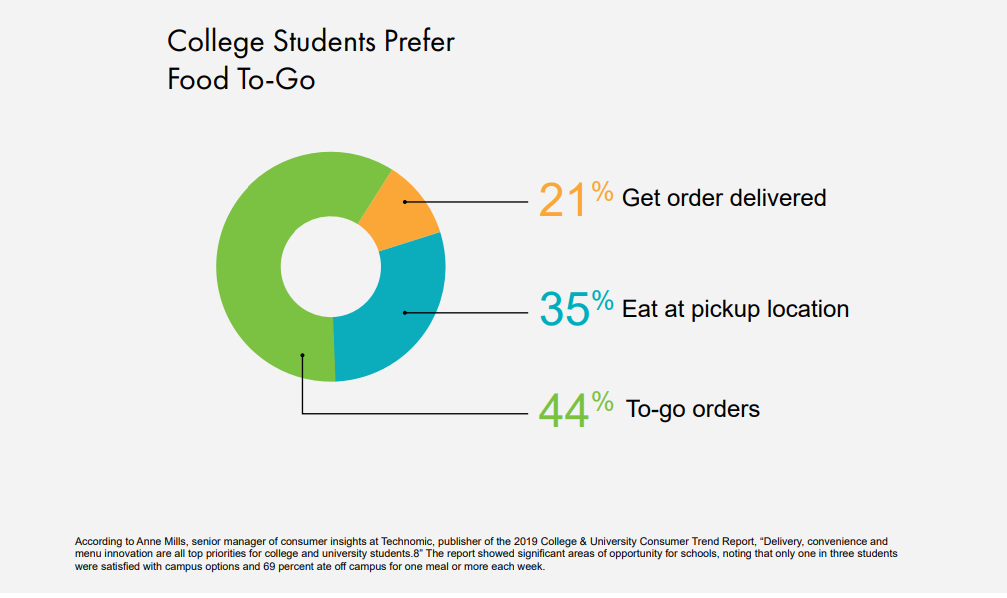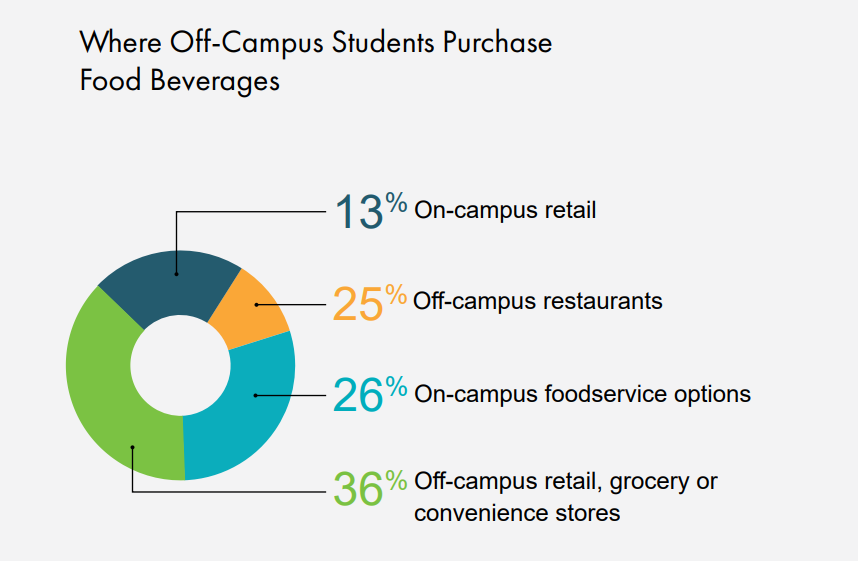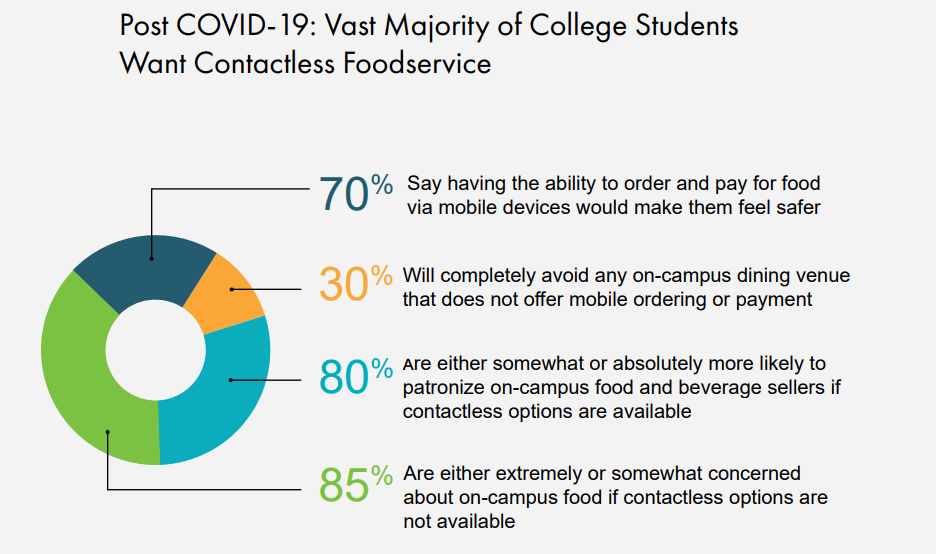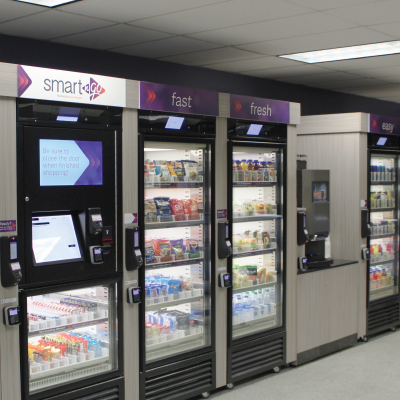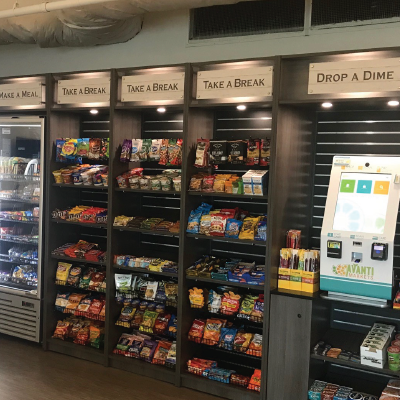COVID-19 & How it is Affecting The College FoodService Landscape
In this guide, you'll learn about how this pandemic has changed the way Campus Dining & Food Services operate.
BEFORE COVID IMPACT:
- Foodservice as an Auxiliary Service
College foodservice (which encompasses dining halls, cafés, convenience or mini markets, traditional cash or card vending machines, smart grab-and-go lockers, etc.) is.... (CONTINUE READING)
- Foodservice Programs Influence School Selection
The quality and availability of these services impacts both student attraction and retention. As many as 25 percent - one out of every four college and university... (CONTINUE READING)
- Campus Foodservice is a Revenue Generator
On-campus food service and vending revenues make up a significant portion of revenue for many U.S. colleges and universities. Most schools require students.... (CONTINUE READING)
- Students Want Delivery, Convenience & Menu Innovations
Although schools have invested considerable amounts of money to create enticing shared dining and retail facilities, students were already trending in favor of to-go meals and delivery. Delivery, convenience.... (CONTINUE READING)
- In Demand: Contactless Food Service Options
A Nutrislice® student survey of more than 800 college and university students across America found that fewer than half offered contactless ordering and payment capabilities or contactless vending. One in five... (CONTINUE READING)
AFTER COVID IMPACT:
- COVID-19 Negatively Impacts Campus Foodservice Operators
COVID-19 did not just trigger a health emergency worldwide, it also triggered an economic earthquake, whose aftershocks are only beginning to be felt by U.S. colleges and universities. Nearly 40 percent of member...(CONTINUE READING)
- Where Students Live Impacts Foodservice Preferences
One impact of COVID-19 is more off-campus living. Students who live offcampus purchase food and beverages very differently than when they live...(CONTINUE READING)
- Post COVID-19: Vast Majority of Students Want Contactless Foodservice
Students also have serious concerns about the safety of campus foodservice and plan to change the way they consume, order and pay for food when returning to campus. Referring...
- Avanti Markets offers College Campus Dining Alternatives
Wherever an institution has wall space, electricity and an internet connection, colleges can use Avanti Markets’ unattended markets to place food markets with contactless solutions across multiple campus...(CONTINUE READING)
Download our content EBOOK to help guide your Campus through the new era of College Food Services.
Foodservice: Part of Auxiliary Services
College foodservice (which encompasses dining halls, cafés, convenience or mini markets, traditional cash or card vending machines, smart grab-and-go lockers, etc.) is considered one of the top ways colleges and universities can increase revenues through what is referred to “auxiliary services.”
Auxiliary services include any areas outside of courses that institutions can leverage to make money, such as:
• Foodservice
• Housing
• Events
• Bookstores and other retail markets
• Parking and transportation
Foodservice Programs Influence School Selection
The quality and availability of these services impacts both student attraction and retention. As many as 25 percent - one out of every four college and university students - say the food service programs offered by institutions impacted which school they ultimately decided to attend. There are even online lists of colleges ranked for “best college food in America” available to prospective students for whom this is an important factor.
Campus dining today is all about freshness, customization and convenience, while delivering vibrant restaurant and retail concepts.
Campus Foodservice is a Revenue Generator
On-campus food service and vending revenues make up a significant portion of revenue for many U.S. colleges and universities. Most schools require students who live on campus to purchase a meal plan, with tiered meal plans based on the number of meals students plan to eat on campus per day. Many students underutilized their plans, which are often nonrefundable, making foodservice an even more profitable service for schools.
Nearly one out of every four 18-20 year olds go without or replace at least one meal a day with snacks. Breakfast was the most common meal students skipped, when asked how often they ate the following:
• Breakfast – 4.9 days/week
• Lunch – 5.7 days/week
• Dinner – 6.1 days/week
• Snacks – 7.5 times/week
While the cost of food for U.S. consumers has risen 26 percent over the past ten years, the average college meal plan has increased by 47 percent over the past decade. Undergraduates who eat all their meals on campus may spend up to 85 percent more per day on food than they would if they cooked their meals at home.
The average college and university charges about $18.75 per day, for a three-meal-a-day dining contract, compared to the less than $11 a day a single person spends (on average) for food. Some universities charge as much as $27-36 per day.
On-campus foodservice (dining, vending, cafés and markets)
generated over $18B in sales revenue in 2018.
Students Want Delivery, Convenience & Menu Innovations
Although schools have invested considerable amounts of money to create enticing shared dining and retail facilities, students were already trending in favor of take-to-go meals and delivery.
Delivery, convenience and menu innovation are all top priorities for college and university students.
Specifically, delivery services were
increasingly desirable to students.
More than one in four students want on-campus foodservice locations to offer delivery.
In Demand: Contactless Food Service Options
A Nutrislice® student survey of more than 800 college and university students across America found that fewer than half offered contactless ordering and payment capabilities or contactless vending.
One in five students
said there were no contactless dining options available to them on-campus at all:
COVID-19 Will Impact Foodservice Operations
COVID-19 did not just trigger a health emergency worldwide, it also triggered an economic earthquake, whose aftershocks are only beginning to be felt by U.S. colleges and universities.
Nearly 40 percent of member institutions in the National Association of College and University Foodservices, or NACUFS, contract out all or part of their campus dining. By April 2020 college foodservice giant Aramark was already reporting a
$325M financial hit due to COVID-19.
Of colleges and universities reopening for the fall, many are limiting dorm rooms to one student per room and some are closing large common dining halls for the coming year. With significant reductions to the numbers of on-campus students, schools may also be saying goodbye to their dining dollars.
Where Students Live Impacts Foodservice Preferences
One impact of COVID-19 is more off-campus living. Students who live offcampus purchase food and beverages very differently than when they live oncampus. According to FoodServiceDirector.com, less than one in four students who live off campus purchase from on-campus foodservice locations and even fewer (only about one in ten students) buy food from campus retail facilities.
Only 36% of off-campus students patronize on-campus foodservice locations.
Post COVID-19: Vast Majority of Students Want Contactless Foodservice
Students also have serious concerns about the safety of campus foodservice and plan to change the way they consume, order and pay for food when returning to campus. Referring back to the Nutrislice® student survey, 35 percent of students say they do not plan to get food from any on-campus facility (dining hall, restaurant or café).
The vast majority are worried about how they will order and pay for meals if colleges do not provide contactless options on campus, and nearly one out of every three students plan to completely avoid on-campus dining options that do not provide mobile ordering or payment.
85% of students are worried about their safety if contactless options are not available on campus.
Students overwhelmingly want to be able to order food digitally, whether via mobile app or online rather than having to make physical contact with a server or cashier. They also prefer digital menu boards and more than one in four want to have the convenience of smart take-out food and beverage lockers.
Students were asked which of these four things they are willing to sacrifice in exchange for contactless dining on-campus:
69% Want to access menus and order via mobile app / online
44% Prefer digital menu boards at dining locations vs physical menus
28% Want colleges to provide pop-up food pickup locations throughout the campus
24% Want to be able to get food from smart take-out lockers
Health and safety concerns are so important to students that they are even willing to make sacrifices if that is what is needed for colleges to provide contactless foodservice options.
Students were asked which of these four things they are willing to sacrifice in exchange for contactless dining on-campus:
38% Variety of Food
22% Dietary Preferences
21% Speed of Service
18% Nutritional Information
Avanti Markets offers College Campus Dining Alternatives
Smart N Go
Intelligent Vending | Swipe, Grab, Go
Smart N Go offers a secure, fresh food vending option for public and semi-public spaces. A modular, intelligent vending system can be designed for spaces both large and small, ideally suited for high traffic location such as college campuses, transportation centers, hotels, entertainment venues and hospital medical centers.
Avanti Micro Market
Self-Checkout Kiosk | Shop, Scan, Go
The Avanti Market is the original fresh food micro market company break room solution ideally suited for semi-private access locations. Hundreds of food options from fresh, to frozen, beverages and snacks.
Express
By Avanti Markets | Walk In, Walk Out
The ultimate combination of customer convenience and technology. Market users of Express by Avanti Markets scan to enter the market, grab what they want and walk out. No checkout. Modular market system for a variety of footprints and locations.
Contactless Shopping
Hundreds of food options through a safe shopping experience, bringing more peace of mind to your campus.
Multiple Market Options
Choose the market type that is right for each location on campus, with varying levels of access and security.
Ready to make your Campus Dining as safe as possible for reopening?
Fill out the form below to learn more from our customer success team.
Micro Markets
Products for Campus-Wide Solutions
It's time to leave the operational headaches of food service behind.
Avanti Markets will provide the solutions you need for on-campus dining services, no matter what the location or need you're solving for. Whether self-operating or partnering with our nationwide network of providers, you'll be in control of how and where these solutions are implemented. You can offer 24/7 convenience for food, snacks, coffee and more, all at no cost to you.
Contactless purchase options bring safety and peace of mind to your campus community, while still providing fresh and healthy options. Check out our unattended retail solutions below and contact us for more information.
Our solutions don't have to be limited to food service. Provide PPE, books, campus gear and more through unattended retail.
Avanti Markets
1217 SW 7th St. | Suite 100
Renton, WA 98057
365 Retail Markets HQ
1743 Maplelawn Dr.
Troy, MI 48084
Stay Connected
Follow us on social media:
All Rights Reserved | Avanti Markets





